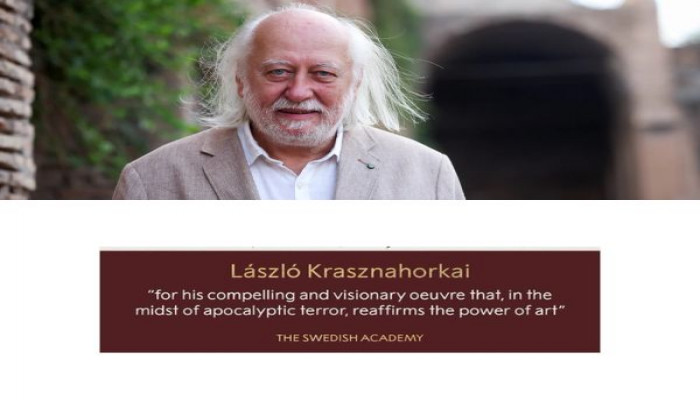Hungarian author László Krasznahorkai wins 2025 Nobel Prize in Literature for visionary storytelling
- In Reports
- 07:12 PM, Oct 09, 2025
- Myind Staff
Hungarian author László Krasznahorkai has been awarded the 2025 Nobel Prize in Literature “for his compelling and visionary oeuvre that, in the midst of apocalyptic terror, reaffirms the power of art,” the Swedish Academy in Stockholm announced on Thursday.
Born in 1954 in the small town of Gyula in southeastern Hungary, Krasznahorkai rose to international fame with Sátántangó (1985; Satantango, 2012), a haunting yet mesmerising tale of a struggling rural community on a Hungarian collective farm. His unique style, characterised by long, flowing sentences that capture the relentlessness of human life, continued to shine in Az ellenállás melankóliája (1989; The Melancholy of Resistance, 1998), a vivid allegory of violence and chaos in a small town.
Other notable works include Háború és háború (1999; War & War, 2006), Báró Wenckheim hazatér (2016; Baron Wenckheim’s Homecoming, 2019), and Herscht 07769 (2021; Herscht 07769: A Novel, 2024), all exploring social collapse, human folly, and the search for meaning in a world on the edge of order and disorder.
Beyond apocalyptic themes, Krasznahorkai has explored contemplative and philosophical narratives inspired by his travels in East Asia. Works such as Északról hegy, Délről tó, Nyugatról utak, Keletről folyó (2003; A Mountain to the North, a Lake to the South, Paths to the West, a River to the East, 2022) and Seiobo járt odalent (2008; Seiobo There Below, 2013), along with shorter works like Aprómunka egy palotáért (2018; Spadework for a Palace, 2020), display his versatility, blending humour, history, and deep philosophical insight.
Krasznahorkai, 71, has received numerous awards, including the 2015 Man Booker International Prize. The judges praised his “extraordinary sentences, sentences of incredible length that go to incredible lengths, their tone switching from solemn to madcap to quizzical to desolate as they go their wayward way.”
"He is a hypnotic writer," said his English translator, the poet George Szirtes. "He draws you in until the world he conjures echoes and echoes inside you, until it's your own vision of order and chaos."
The Nobel Prize in Literature is the fourth Nobel announced in 2025, following awards in medicine, physics, and chemistry. Recent chemistry winners include Susumu Kitagawa, Richard Robson, and Omar M. Yaghi. The physics prize went to John Clarke, Michel H. Devoret, and John M. Martinis, and the medicine prize was awarded to Mary E. Brunkow, Fred Ramsdell, and Dr. Shimon Sakaguchi.
Since 1901, the Nobel Prize in Literature has been awarded 117 times to 121 authors. Eighteen women have received it, with Swedish author Selma Lagerlöf being the first in 1909. The youngest laureate was Rudyard Kipling at 41, and the oldest was Doris Lessing at 87. No author has received the award twice, though several, including Rabindranath Tagore and William Faulkner, won it after a single nomination.
The 2025 Nobel Prize carries a cash award of SEK 11 million, along with an 18-carat gold medal and a diploma. Alfred Nobel’s will directed that his fortune be invested safely and the income awarded annually to those who “conferred the greatest benefit to humankind.”







Comments